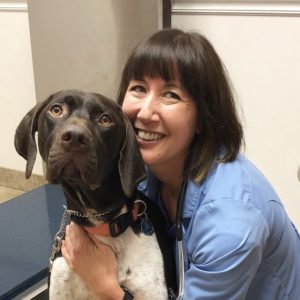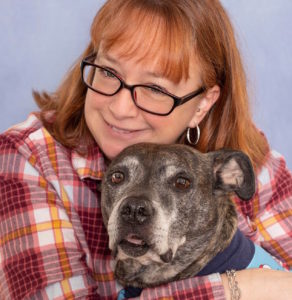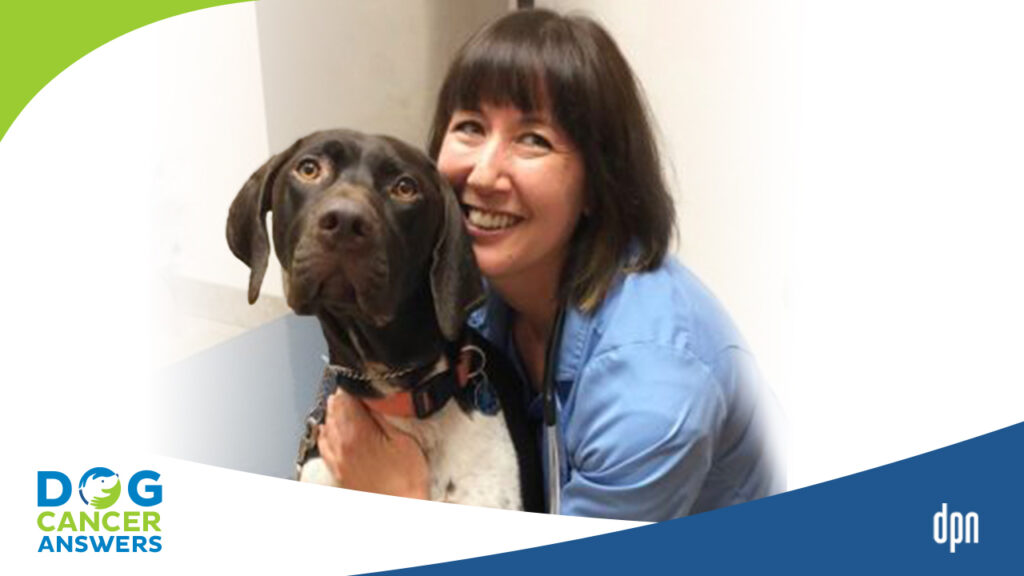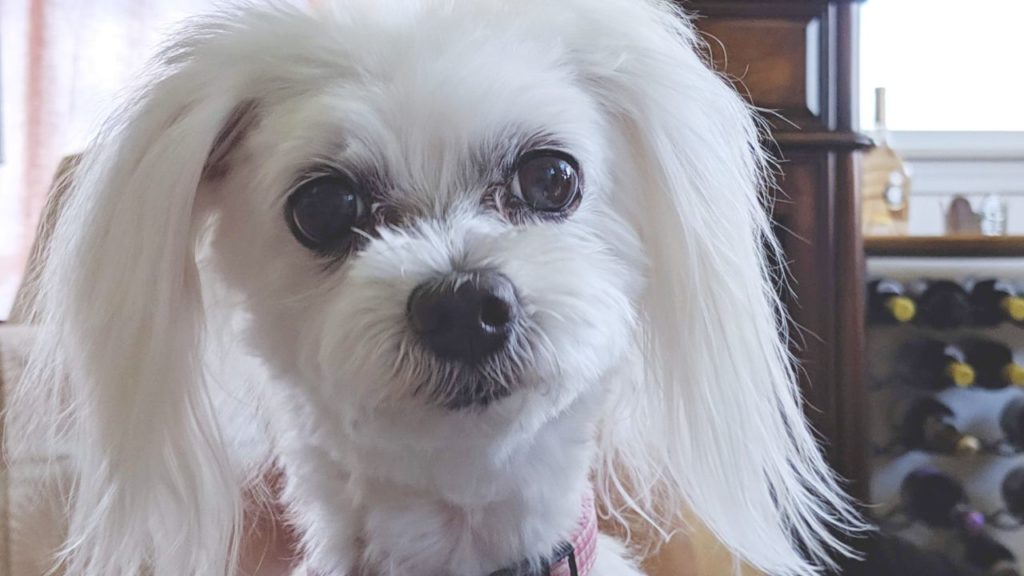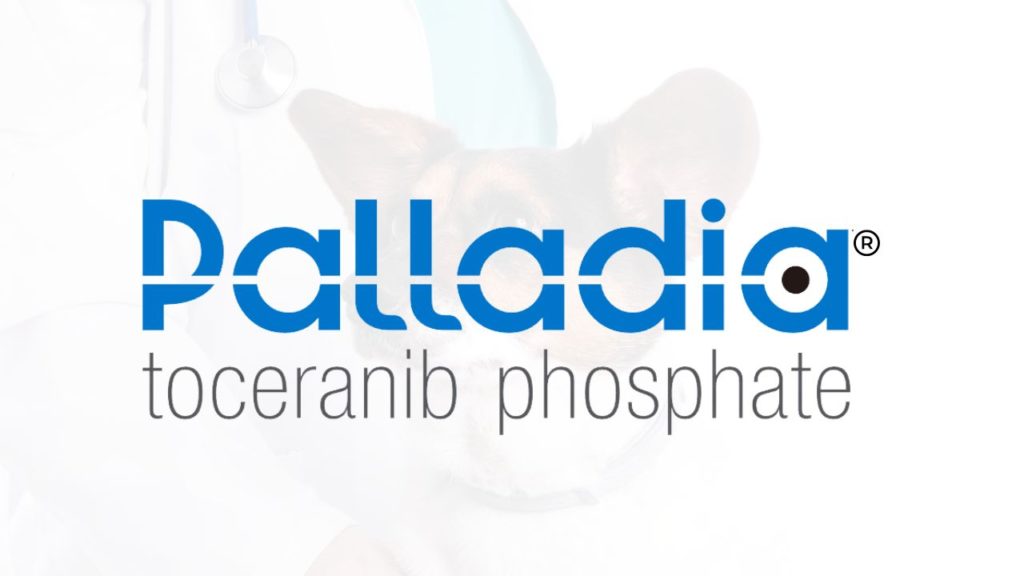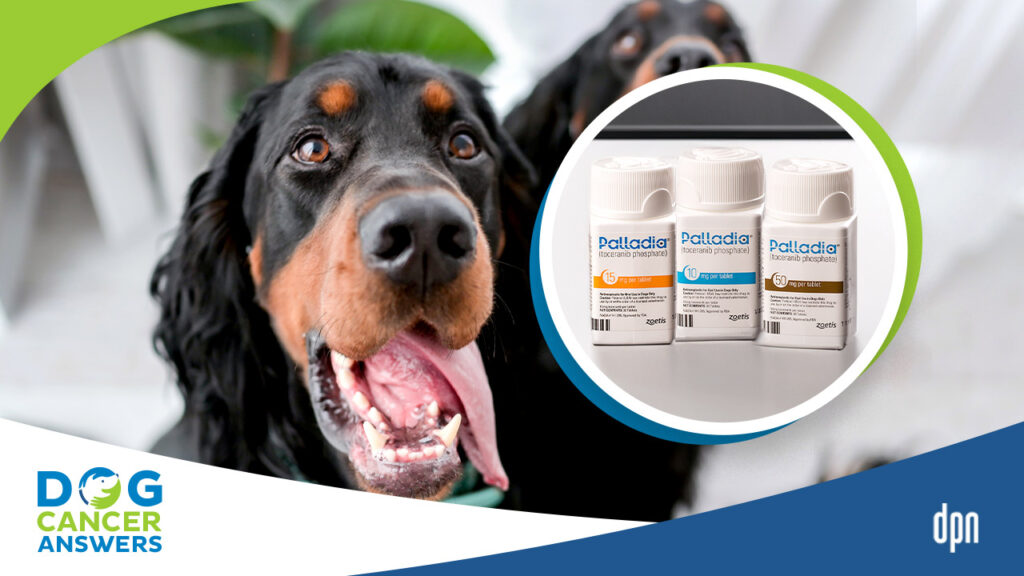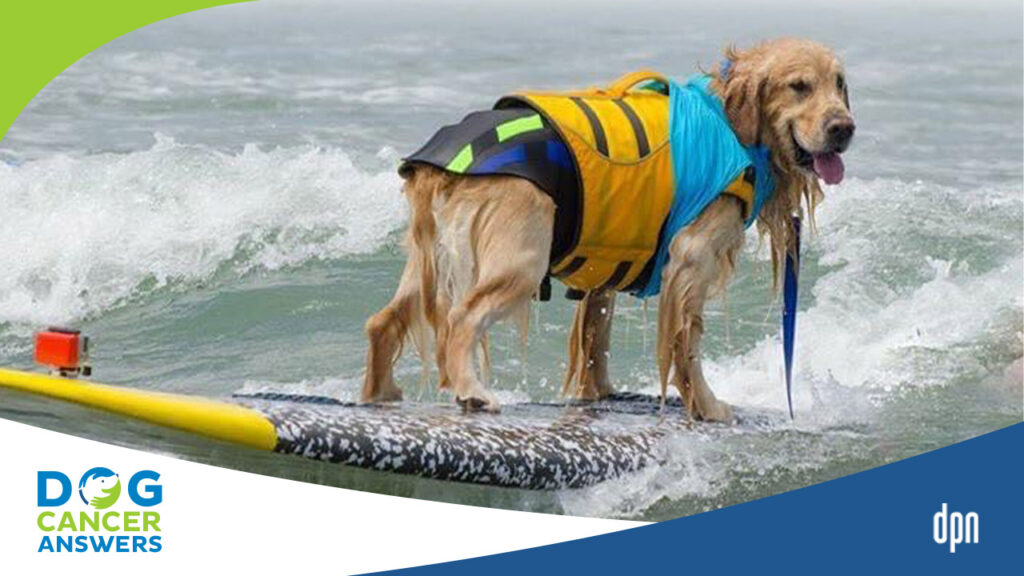EPISODE 183 | RELEASED September 12, 2022
Dog Cancer True Tail: Dunbar | Dr. Katie Berlin & Tara Diehl
Dunbar’s no cat, but he does seem to have nine lives. With the help of his loving owners and great veterinary team, he has been fighting cancer since 2019.
SHOW NOTES
When Dunbar coughed up blood in October 2019, Tara knew things were about to get rough. He was soon diagnosed with undifferentiated pulmonary carcinoma with lymph node involvement. But thanks to the dedication of his humans and an excellent pet health insurance policy, Dunbar has been able to get the treatments he needed.
Through surgery and chemotherapy, Dunbar has always been happy and outgoing, lovingly referred to as “the mayor” by his veterinarian Kate Berlin. So when the cancer reared its head again in early 2021, they resumed the fight.
Dunbar is now 12 years old, and sweet as ever. Listen in to hear the details of his story, as well as the integrative therapies and supplements that have been helpful alongside his chemotherapy treatments.
Links Mentioned in Today’s Show:
[00:00:00] >> Tara Diehl: He called me from that appointment and said, "I thought the techs put up the wrong x-ray for me. I thought it was the original one from after his surgery, and I had to double check that it was the correct x-ray because it was gone."
[00:00:16] >> Announcer: Welcome to Dog Cancer Answers, where we help you help your dog with cancer.
[00:00:23] >> Molly Jacobson: Hello friend. Today on Dog Cancer Answers, we have a special kind of episode to bring to you, a conversation with Tara, who is the loving dog mom to Dunbar, who is sort of a cancer survivor miracle dog with a great True Tail to share with you. And Dunbar’s veterinarian, Dr. Katie Berlin is also joining us to talk a little bit about her perspective on this really truly amazing true tale.
Dr. Katie Berlin, Tara, thank you so much for joining us today.
[00:00:59] >> Dr. Katie Berlin: Thank you.
[00:00:59] >> Tara Diehl: Thank you so much for having us. This is so much fun.
[00:01:02] >> Molly Jacobson: I’m so looking forward to this.
Yeah, Tara, you’ve been sort of a, a model Dog Cancer Answers listener for a long time, ’cause I know you’ve, you have a long and wonderful story to tell and you’ve got your veterinarian, Dr. Katie Berlin, who’s told part of the story before in a previous episode and we’ll put a link in the show notes so everybody can listen to that from her perspective. And so I’m just excited to hear the latest on Dunbar.
But first let’s hear a little bit about Dunbar when Dunbar was diagnosed with cancer, what it was, when it was, what happened, and what’s gone on?
[00:01:41] >> Tara Diehl: Well, um, Dunbar seemed fine. You know, he’s getting a little older. He is 12 now, but, uh, he was getting a little older, but no issues, nothing going on with him, doing really well. And he woke me up at 3:00 AM, coughing blood in my face, October 18th, 2019. I was a vet tech for 15 years. So I knew this was not a good thing.
I know lung cancer – primary lung cancer – is not a good thing. It’s not in humans either, but it’s not in our pets. So it stopped. It was just that one time.
[00:02:12] >> Molly Jacobson: And that’s what you assumed it was, Tara? You assumed right then at three in the morning, this is lung cancer. That’s why I have a face full of blood.
[00:02:19] >> Tara Diehl: Yes.
[00:02:20] >> Molly Jacobson: Okay.
[00:02:20] >> Tara Diehl: Yeah. And he stopped. He stopped coughing. Stopped bleeding. Acting completely fine. So I waited till the regular vet office opened, took him in, they did imaging. There was an obvious something there. Sent it out for diagnostics, did a follow up, I think we had him on antibiotics for a little while. Did a follow up, and that’s, was with Dr. Berlin when we did the follow up.
I pretty much knew that it wasn’t going to be good news, but had that glimmer of hope because when it went out to the radiologist, they weren’t a hundred percent sure that it was a mass. So, you know, there’s that glimmer, but I, I kind of knew better and was preparing for the worst at that point.
[00:03:02] >> Molly Jacobson: What else could it have been other than a mass in the lungs?
[00:03:05] >> Tara Diehl: Even though – the one specialist, when we started going down to the specialist, uh, the ultrasound specialist said it could have been something they inhaled. It could have been infection or, um, possibly, um, fungal infection as well.
[00:03:21] >> Molly Jacobson: Oh, okay.
[00:03:21] >> Tara Diehl: So those were kind of the, the far out possibilities.
[00:03:25] >> Molly Jacobson: Right, but it looked like a mass, like a tumor. It wasn’t like diffuse where you would see maybe an infection was all over the place. It was really concentrated.
[00:03:34] >> Tara Diehl: Yeah.
[00:03:35] >> Molly Jacobson: Oh, that must have been so scary.
[00:03:37] >> Dr. Katie Berlin: Yeah. The kind of thing you just, you do not wanna see on, on a radiograph on one of your favorite dogs ever.
[00:03:43] >> Molly Jacobson: Why was he one of your favorite dogs?
[00:03:46] >> Dr. Katie Berlin: Oh my gosh. Dunbar’s just like, Dunbar’s just the, the man. I mean, he is, he’s like a brown dog, you know, he’s like kind of a medium size dog and he is brown and he just comes in and he owns the entire vet clinic when he comes in. Like everybody’s there to see him, he’s the mayor, everybody, whatever you’re doing is like less important.
[00:04:09] >> Molly Jacobson: He’s, he’s like holding court wherever he goes.
[00:04:11] >> Dr. Katie Berlin: Yep. Yep. Like we have multiple pictures of him just like plopping down on someone’s lap in the middle of the treatment area, you know, or the, or the phone room. Like he just is a love machine and he’s very demanding about wanting his attention and his treats. And he’s a lap sitter, and there’s just something about him. You know, you like you meet those animals that you just, they’re like you’re bud right away.
And he was just, I just felt like we were buds right away. And he’s buds with everyone, so I can’t feel that flattered by that, but it was really, he always made my whole day to see him. And he came with Tara, which was definitely a big bonus because, you know, we have pets that we love that come with people that are a little bit, maybe less of a connection. And then you have people that you love and the animals don’t really wanna have anything to do with you.
But seeing that family come in together, like you and Chuck and Dunbar and all of your other animals, like you just, just brighten the place up.
[00:05:10] >> Tara Diehl: Aw.
[00:05:11] >> Molly Jacobson: That’s wonderful. So you send the radiographs off and, I’m remembering Katie, there’s a part of the story where you had to sort of hurry those up. Am I misremembering?
[00:05:22] >> Dr. Katie Berlin: Oh, yeah, actually, I think you’re right. I think I might have, um-
[00:05:27] >> Molly Jacobson: Said, I know you’ve shut the whole thing down.
[00:05:29] >> Dr. Katie Berlin: I might’ve blown a small gasket.
[00:05:30] >> Molly Jacobson: You have to send these tonight. This is Dunbar.
[00:05:32] >> Dr. Katie Berlin: Right. Yeah. I’m pretty sure we were, you were the last appointment of the day maybe, and, um, we had taken the radiographs and you know, you get that like twisted knot in your stomach when you see them and you just know that it’s not good. And did we really need a radiologist to tell us absolutely at that point, like probably not, but there’s no way that any of us is gonna make this call, you know, for this patient and this family, because you just wanna do what’s best and we wanna be giving you right, the right information.
And so I wanted a radiologist to look at those and you agreed. It was the evening. And I think the technicians had shut down the x-ray unit, um, and the computer that goes with it. And I believe that I had suggested strongly that that was not something that could wait until tomorrow. Um, and I, I admit I probably didn’t say that as diplomatically as I could have, because I was really anxious, you know, and I did not want us to have to wait another 12 hours to get those back.
[00:06:30] >> Molly Jacobson: So when you got them back, it was cancer. It was lung cancer.
[00:06:35] >> Dr. Katie Berlin: Yeah. I mean they can’t, you know, diagnose definitively on a, on a radiograph image, but it was in exactly the same place as it was in the previous images and, um, antibiotics and time had not done anything to change it. And that, that was a bad thing.
And one thing, you know, you had mentioned, Tara, that it could be a fungal infection. And there are certain places in the country where that’s gonna be a lot more likely. Pennsylvania is not one of them. We just don’t see that many lung infections caused by fungal disease. I’ve seen, I think one, and it was actually nasal passages of a very young dog.
And that was a super unusual case. That was a really weird case. But it’s just not something that we see a lot of. And typically when we do see it, it looks more like a diffuse pattern, like lymphoma, like lymphoma tends to, and not just one solid mass, but it was pretty unlikely in our area.
[00:07:28] >> Molly Jacobson: Where would you be more likely to suspect a fungal infection? Just what areas of the country?
[00:07:33] >> Dr. Katie Berlin: I mean, it just depends. In the south definitely, some areas around certain bodies of water. I’m not a huge expert in that because I’ve never lived in one of those areas.
[00:07:42] >> Molly Jacobson: Okay.
[00:07:42] >> Dr. Katie Berlin: So I’ve never actually seen a high incidence, but it’s always on the list. If you have weird looking lung stuff, it’s always on the list. And we’re always asking if the dog traveled, you know, and stuff like that, but it was unlikely in Dunbar’s case.
[00:07:55] >> Molly Jacobson: So everything else was ruled out. So the most likely thing was, yeah. So what happened next?
[00:08:01] >> Tara Diehl: He went to a specialty hospital. We went down, they did an ultrasound. That’s where again, the doctor said, oh, it could possibly be something that he inhaled, but we’re gonna set up a CT. And we did a consult with that surgeon and she said, it’s highly unlikely that it’s something that he inhaled. She said, if we lived – I think California or something, I think that was the state, I can’t remember – maybe, but not the way it’s presenting, not the way it looks. You know, she really didn’t feel that way.
She thought that it was removable, resectable, through his ribs without cutting into his rib cage, but wasn’t sure. She’d know with the CT. We scheduled the CT with the surgery after, you know, if it was able to come between his ribs, we were willing to do that surgery because he was so healthy otherwise. And we have pet insurance, you know-
[00:08:57] >> Molly Jacobson: What pet insurance? I know our listeners are gonna wanna know.
[00:09:01] >> Tara Diehl: Which pet insurance did you say?
[00:09:03] >> Molly Jacobson: Yeah.
[00:09:03] >> Tara Diehl: Is it okay to say?
[00:09:04] >> Molly Jacobson: Which company?
[00:09:05] >> Tara Diehl: Um, we, I’ve had Pet Plan since 2010. They’re now Fetch.
[00:09:09] >> Molly Jacobson: Okay.
[00:09:10] >> Tara Diehl: They’ve been around. Because they’ve been around, you’ll see reviews, oh, I hate them because my premium goes up every year. Well, your pet’s aging, it does, and it does with all of the pet insurances. I have had no problems with claims. You know, you give them what they ask for and I don’t even have to submit extra. They were a lifesaver in this case because it took money out of the equation. It kind of took his age out of the equation because with the cost, the CT and the surgery total came out to $7,000.
[00:09:38] >> Molly Jacobson: Oh.
[00:09:38] >> Tara Diehl: That’s a lot for an eight year old dog with suspected primary lung cancer that you know the prognosis probably isn’t going to be good. So it kind of took the money out of the equation. We didn’t really have to worry so much about that aspect of things.
[00:09:54] >> Molly Jacobson: That’s really, really wonderful. And the reason I say it’s okay is not necessarily to, you know, plug one company over another, but there’s the concept of health insurance.
So few Americans insure their pets, but I’ve heard so many times these stories about how people can do things because they don’t have to worry about the finances because they know it’s going to be covered or things are going to be covered that they don’t have to worry about so they can have their finances go towards something that maybe isn’t covered, which just helps to eliminate that from your calculations in such a heavy way.
[00:10:30] >> Tara Diehl: Yeah.
[00:10:30] >> Molly Jacobson: That really gets in the way of a lot of people caring for their dogs, not just with cancer, but with lots of other illnesses. So it was covered.
[00:10:38] >> Tara Diehl: Yes.
[00:10:39] >> Molly Jacobson: How wonderful. So you got the CT and the surgery.
[00:10:41] >> Tara Diehl: And the surgery the same day. He stayed there two nights, came home, we saw the oncologist after. So the pathology report came back and that really wasn’t good. It was a primary undifferentiated pulmonary carcinoma with lymph node involvement.
[00:11:00] >> Molly Jacobson: Oh. So it had already spread.
[00:11:02] >> Tara Diehl: The lymph node was attached to his aorta, so they couldn’t remove it. That was the other problem.
[00:11:07] >> Molly Jacobson: Oh.
[00:11:08] >> Tara Diehl: So he had a two to three month prognosis without chemo. Six months with. Quality of life has always been the factor with every move we’ve made with him. And chemo, we said, let’s just try it. Again, we’ve got the pet insurance, it was $350 a dose. He had to do one a week for four weeks, and then it got stretched out one a month or something. But again, the pet insurance covers that. So let’s try it. See if he gets sick or not. Doses, you know, I, I know you’ve talked about it on podcasts as well, dogs tend to react differently to chemo than humans.
You wouldn’t have guessed that he was going through any chemo at all. He had zero side effects to that chemo. We started that, we did that for the extent, and then his x-rays, you know, had been clear for quite a while after the chemo.
[00:11:58] >> Molly Jacobson: So the surgery got most of the tumor out, it sounds like.
[00:12:01] >> Tara Diehl: All of it. Yep. They removed the entire lobe.
[00:12:03] >> Molly Jacobson: All of it.
[00:12:04] >> Tara Diehl: Yeah. All of it except that lymph node.
[00:12:06] >> Molly Jacobson: That’s great. And then the chemo is cleaning up the metastasis, and it was clear.
[00:12:10] >> Tara Diehl: Yeah.
[00:12:11] >> Molly Jacobson: Wow.
[00:12:11] >> Tara Diehl: Until January of, uh, 2021.
[00:12:15] >> Molly Jacobson: Okay. So that’s how many months later, at just over a year?
[00:12:18] >> Tara Diehl: Uh, that was over a year after his surgery and over a year after his diagnosis. So he already was six months past his max diagnosis at that point. They saw something on his staging x-rays again. So we started a different chemo, went back, x-rays again, didn’t work. It actually grew. So then we started Palladia. And it disappeared. It disappeared so much that when, um, the oncologist called me – ’cause of course we’re, COVID restrictions, can’t go in at that time – so this was, this was, that made it a little, even more scary. Um, we were kind of lucky that we got to go in before COVID and meet the oncologist and meet everybody, that made it a little less scary. But he called me from that appointment and said, "I thought the techs put up the wrong x-ray for me. I thought it was the original one from after his surgery, and I had to double check that it was the correct x-ray because it was gone." We never expected that.
[00:13:17] >> Molly Jacobson: How long was he on Palladia?
[00:13:19] >> Tara Diehl: At that point, three months, maybe.
[00:13:22] >> Molly Jacobson: Okay.
[00:13:23] >> Tara Diehl: It was his first restaging x-rays from starting Palladia. So I wanna say three months. And he’s been on Palladia ever since, um, in between there-
[00:13:33] >> Molly Jacobson: And he tolerates it well.
[00:13:34] >> Tara Diehl: Yeah, he does. Once in a while, he’ll have some diarrhea and we have to do a 10 day stop, and then start over again and he’s pretty good. In between there-
[00:13:43] >> Molly Jacobson: Okay.
[00:13:43] >> Tara Diehl: -when the mass had come back, I did do a phone consult with Dr. Dressler to tweak some things, to see if there were any supplements I was overlooking, anything else he recommended. So we did do a phone consult there and, and tweak some things. But other than that, that was it. The Palladia for some reason is working for him, even though our oncologist, you know, said it’s kind of a, a last ditch thing. It’s a let’s see if it works kind of thing. It’s not labeled for primary lung cancer.
[00:14:12] >> Molly Jacobson: Right. So you mentioned supplements. So what else have you been doing with Dunbar since?
[00:14:18] >> Tara Diehl: I have a whole list.
[00:14:19] >> Molly Jacobson: And when did you start?
[00:14:22] >> Tara Diehl: Right. He’s been-
[00:14:24] >> Molly Jacobson: You embraced the full spectrum approach?
[00:14:26] >> Tara Diehl: Yes, yes, absolutely. Um, and he goes for acupuncture every three weeks as well. So insurance covers that.
[00:14:34] >> Molly Jacobson: My word.
[00:14:35] >> Tara Diehl: They cover any supplements I get from a veterinarian or from his integrative vet. They don’t cover anything I get over the counter. So-
[00:14:44] >> Molly Jacobson: Over the counter. Okay.
[00:14:45] >> Tara Diehl: -his cordyceps, turkey tail, those things I pay for out of pocket. Apocaps he takes as well, I pay for them out of pocket. Um, none of our vets around here carry them. So that’s where insurance has come in as well because it’s covering the other things so it frees up that little bit of extra money for me for these supplements. After I talked to Dr. Dressler, we added in, um, Traumeel, which is a natural anti-inflammatory, and we added in, um car, carcinosin. I, I can’t pronounce it, um, it’s a homeopathic.
[00:15:23] >> Molly Jacobson: Okay. We’ll figure out what that is.
[00:15:26] >> Tara Diehl: And he said that’s just to try, you know, homeopathic stuff is, we don’t know. So we threw that in there as well. He’s been on the dog cancer diet this whole time.
[00:15:37] >> Molly Jacobson: Okay.
[00:15:37] >> Tara Diehl: He has a veterinary quality fish oil supplement that he’s been on this whole time as well. EverPup, K9 Immunity is his other one. So he gets the litany. I split them up. He tolerates them well. I know sometimes they can have some tummy issues, but he tolerates everything well, and we’re lucky.
[00:15:56] >> Molly Jacobson: It’s wonderful.
[00:15:57] >> Dr. Katie Berlin: You’re lucky. And you’ve also done about as much for him as, as anybody, any dog could ask for, I think. You’ve had his best interest in mind. Like you said, his quality of life has been at the forefront of everything you’ve done. And I know that there are people listening who will say, like, I don’t know if I would’ve done that first surgery, you know, like taking out a lung lobe is a big deal. And I just wanna tell you, like, I saw Dunbar after that surgery.
Like the biggest problem he had was one of his stitches was sticking out and like the huge incision that he had was like, he had to stretch his skin again to have full range of motion on that side of his body. But he did not miss a beat, man. That dog is, he looks like the healthiest dog in the clinic when he’s there.
His nose is a little grayer than it was when we started all this, but he, he looks absolutely happy. In fact, I think for a while he was getting a little chubby and you had to put him on a little bit of a diet.
[00:16:54] >> Tara Diehl: Yes.
[00:16:56] >> Dr. Katie Berlin: Um, and he just like, he has not missed a beat and he has not ever had a look on his face that I’ve ever seen that said, I don’t feel well, I feel sorry for myself, like, why is this happening to me? He just, you know, he has a love for you and a love for life and that, I did, never saw that stop for one second. And I think if it had, you would’ve chosen a different path for him.
And so he’s taught me lessons in, you know, sort of seeing the best in the situation and saying, you know what, this is what’s going on and I’m gonna deal with it the way that I always do, which is to take it in stride and love my people. And, um, he’s lucky, and you’re lucky, but you guys have also done a lot to make that luck together.
[00:17:40] >> Molly Jacobson: That’s a good place for us to stop and take a quick break and listen to some of our sponsors. And when we come back, I want to hear Dr. Katie Berlin if you’d share with us a little bit about what you think about whether attitude has a role in treating dog cancer.
And we’re back with Tara, whose wonderful dog Dunbar has an amazing True Tail, and Dr. Katie Berlin, who is Dunbar’s vet. And Dr. Berlin, I wanted you to just weigh in a little bit with your experience. Does the attitude of the dog and the owner come into play when it comes to treating dog cancer?
[00:18:25] >> Dr. Katie Berlin: Yes. I think that’s – the short answer is yes, it definitely does. Can the attitude of the dog and the family turn a case that would’ve ended badly into a case that ended miraculously or that’s been, been at least turning out miraculously… I don’t know. It’s funny the, the way that the timing worked out, because I think I met you Molly, and Jim, about the time that Dunbar was diagnosed, because I talked about him when I met you.
And so he’s really been a part of the conversations that we’ve had together almost every time we’ve talked. And I was reading Dog Cancer Survival Guide at that time and because of meeting you and, um, so that was something that Tara and I could sort of bond over and talk about. And, uh, it was all just like a strange confluence of events at that time.
And then, you know, that he just kept coming up. And then I was also starting to do acupuncture at that time and learning about, you know, the ways that maybe the medicine that we’re taught in vet school – it’s not to say that, I don’t really believe in alternative treatments, I believe in treatments that work and don’t work.
And I feel like sometimes there are treatments that [do] work that we aren’t taught about, and that doesn’t mean that they’re not legitimate. It just means that they’re not in the curriculum that we’re handed. And it seems a little bit like magic when those things work, because we haven’t learned about them in the traditional sense.
And so I was starting to feel like there were just some, you know, there was just kind of a little bit of magic going on in the background when Dunbar and his family were dealing with all of this. And do I really believe in magic? Not really, I don’t think, but do I believe that there are things going on that we don’t have all the answers to?
Yes. And I think in Dunbar’s case, that’s gotta be the truth, you know, you have what you said is a, kind of a perfect package of this amazing dog who has this thirst for life and just a love for his life, and you have a family who was always meant to be with him. Because Dunbar had it a little bit rough at the beginning.
He’s been through a lot of stuff before this, like, he has survived like a list of weird things and, yeah. Um.
[00:20:47] >> Molly Jacobson: Really, like what?
[00:20:50] >> Dr. Katie Berlin: Uh, Tara, do you wanna take that part?
[00:20:52] >> Tara Diehl: Sure. He came from South Carolina. They pulled him, he was on death row, first of all. So a rescue by me in Northeast Pennsylvania pulled him because he was such a sweetheart. Had to treat him for heartworm. He had tested negative, they agreed to pull him, then they went to neuter him, retested him, he tested positive. So he had to be treated for heartworm.
[00:21:15] >> Molly Jacobson: Oh my God.
[00:21:15] >> Tara Diehl: Then he started having, just he wasn’t feeling well and, um, was drinking more, urinating more. It happened all of a sudden. So he tested negative for all tick-borne illnesses, multiple times, plus vaccinated for Lyme. You know, what the heck is this? Responding to doxycycline like a tick-borne illness, but it would come back. Finally went to a specialist that had a different tick panel run at a university that ran through Babesia two or three different tests. And he came up positive for two strains of Babesia.
So we had to treat for Babesia, which makes sense why it was responding to the doxycycline, ’cause it’s tick-borne, but he needed a different, he actually had to have two different antibiotics to treat that. So yeah, he’s been through quite a bit. And when he first got sick, his, uh, urine protein: creatinin ratio was almost like not compatible with life, it was so bad. So he’s been through a very, very lot. He’s amazing.
[00:22:18] >> Molly Jacobson: Surviving heartworm is an accomplishment in and of itself, right?
[00:22:21] >> Dr. Katie Berlin: Yeah. And, and you said he was negative, so they agreed to pull him. So if he tested positive at the shelter initially he probably wouldn’t even have made it to you.
[00:22:31] >> Tara Diehl: Yep.
[00:22:31] >> Dr. Katie Berlin: Which is just crazy, like this is like the death defying dog, right? So-
[00:22:35] >> Tara Diehl: Yeah.
[00:22:35] >> Dr. Katie Berlin: I mean, and then he has this family who has pet insurance and they have other animals that they love and they’re just, you know, you and Chuck just, you had a philosophy of life that just gelled really well with him and with what he needed. And you know, and you were open to tinkering with his diet and doing supplements.
And I don’t know if that made any difference, but all I know is if I get cancer, I want that diet and those supplements, because he has no business-
[00:23:01] >> Tara Diehl: Yeah.
[00:23:02] >> Dr. Katie Berlin: -doing as well as he is, and for all this time, and on drugs that aren’t even made for his disease. And, you know, I, he really is a miracle dog. And, um, I am not a religious person in any way. And yet, you know, he’s the kind of case that makes me understand why people do have faith, because he has defied all the odds and nobody can really explain it, including Dr. Clifford, his oncologist, who is an amazing person, and is the first one to say, you know, like he’s done better than he ever expected.
[00:23:35] >> Molly Jacobson: Incredible.
[00:23:36] >> Tara Diehl: Yep. Because here we are more than two and a half years post diagnosis. It’ll be three years post in November.
[00:23:43] >> Molly Jacobson: My word. With a primary lung tumor.
[00:23:46] >> Tara Diehl: Yes.
[00:23:52] >> Dr. Katie Berlin: Yeah, that with a lymph node that couldn’t be taken out. I mean, there’s, that’s just-
[00:23:56] >> Tara Diehl: Yeah.
[00:23:57] >> Dr. Katie Berlin: You don’t hear about people surviving that.
[00:23:59] >> Molly Jacobson: Right.
[00:24:00] >> Dr. Katie Berlin: And I love it ’cause I ran the social media for the vet hospital – i, I’m not there anymore, I moved away and I have a remote job now – and I ran the social media and Tara was like the only one that knew that I was running it because she could message me at that, at that Facebook account. And so I’d get these messages saying, "Dunbar’s radiographs were clear!" You know? Yay! And then we’d just say, yay. It’s, be like Saturday afternoon. And it just made my whole day that that was, you know that he was doing so well and I, I just love getting those messages now, you know, you, you guys really have had quite a journey.
[00:24:34] >> Molly Jacobson: Yeah. So we’re recording this in early July, 2022. Dunbar is still like happy and living his best life. And how often do you go in for checks at this point? Like what, what is your sort of day to month to quarterly life look like with Dunbar?
[00:24:54] >> Tara Diehl: It’s, he goes in every three months now. It was every six weeks. He would get blood work the one visit and then blood work and radiographs the next. Now they do it together because he has been holding steady for so long. You know, and every time we go, Dr. Clifford says, it’s, you know, it’s been this long now. It’s been this long now. And every day’s a gift and yep, it is. It absolutely is.
I used to get nervous. I’ll admit I was a little nervous about even submitting this story for this podcast, because I was like, what if his next scan’s bad? What if, what if, and you can’t think that way. It’s live in the moment. He lives in the moment. He doesn’t think he’s sick. He’s happy go lucky running around. And so I’ve tried to embrace that as well, myself. So.
[00:25:45] >> Molly Jacobson: I think a lot of people whose dogs go through cancer, and they pay as close attention as you’re paying attention to Dunbar, have that experience. I’ve seen that and heard that a lot where people say, my dog taught me something in all of this.
[00:26:01] >> Dr. Katie Berlin: Yeah.
[00:26:01] >> Tara Diehl: Yep.
[00:26:02] >> Dr. Katie Berlin: I think he taught our whole vet team too. You know, I do think we see so many sad cases and cases where everybody seemed to do everything right and it didn’t work out that well, you know, because disease is bad. Bad things happen to good dogs and good people. And it’s easy to get to the point where you just don’t really wanna recommend it anymore. You don’t wanna encourage people to go to the oncologist.
You don’t wanna encourage them to spend the money, or the time, or put that emotional energy into hoping that it’s gonna work. But a case like Dunbar’s – and I’ve had a handful of cases that I would never forget my whole life – because if your dog could be the one that comes out of it like Dunbar, it’s worth making the recommendation, having the conversation, because dog people wanna know.
You know, they wanna know if there’s even a chance and then make that decision for themselves. And, um, success stories, you know, stories where the hope paid off, we have to remember those as much as we remember the sad ones.
[00:27:04] >> Molly Jacobson: Agreed. I’m wondering what Dunbar’s favorite things to do are? Does he like, for example, does he have any water sports he enjoys Tara?
[00:27:14] >> Tara Diehl: Well, we’ve got the dock jumping and he’s retired.
[00:27:16] >> Molly Jacobson: Okay.
[00:27:18] >> Tara Diehl: He was never a big jumper to begin with. He was afraid of water.
[00:27:22] >> Molly Jacobson: ‘Cause you own a dock jumping company. You have a-
[00:27:25] >> Tara Diehl: Yes. Yes, we run a dock jumping pool and, uh, he was afraid of water. So that’s kind of funny. He just would kind of plop off the dock for me, but he, he last jumped in 2020. It was after his surgery and everything, he was still – but his jumps, when I say a jump, his personal best is six foot three inches, you know, to the base of his tail. Um, he was jumping two feet, nine inches that season.
So he just would jump ’cause I asked him to. So I retired him, you know, he goes in to cool off when he is there for the day. That’s about it.
[00:28:01] >> Dr. Katie Berlin: He’s naturally gifted in other ways.
[00:28:04] >> Molly Jacobson: Oh, obviously, yes. He’s clearly above average in all ways.
[00:28:07] >> Dr. Katie Berlin: Yes.
[00:28:08] >> Tara Diehl: Yeah. Yeah. He is our, um, welcome team, you know, when you come to the dock, he’s the welcome dog. He loves everybody. He loves people. You know, that’s his thing. He probably would’ve been a good therapy dog if I would’ve had the time and, and energy to be able to go that route because he does, he loves people. He has that patience. He will sit with you forever if you’ll let him. So.
[00:28:30] >> Dr. Katie Berlin: He’s a therapy dog for Shiloh Veterinary Hospital anyway.
[00:28:33] >> Molly Jacobson: There you go. Well, Tara, thank you so much for coming and sharing your story about Dunbar. I know that this kind of story is an important one and it might seem weird that I ask about all of the details, but I know that’s what people really wanna know, ’cause they wanna, they wanna compare it to their own experience.
[00:28:54] >> Tara Diehl: Yeah.
[00:28:54] >> Molly Jacobson: So I just really appreciate you taking the time and the emotional energy. I know it’s not easy to talk about these things, you know, when you’re going through it, ’cause it’s still very present to you. So I’m just wondering, is there any last word that you wanna tell our listeners? Any last thing that you wanna say?
[00:29:13] >> Tara Diehl: You know, never give up hope. There’s, there’s always something there. Bare minimum, with everything we’ve done for Dunbar, I felt like I was doing something. And that makes a huge difference. Just feeling like you are doing something. Even if maybe it doesn’t make as big of a difference as everything we did with Dunbar did, just knowing that you’re doing something, you know, changing his diet, adding some supplements, just those little things were enough to make me feel better. Like I wasn’t, it wasn’t such an outta control situation.
[00:29:44] >> Molly Jacobson: Dr. Katie Berlin, is there anything?
[00:29:47] >> Dr. Katie Berlin: Well, I mean, I, I have a picture of Dunbar sitting over my right shoulder here, um, that, it’s back on the, uh, on the bookshelf there.
[00:29:57] >> Molly Jacobson: I see it on the bookshelf.
[00:29:58] >> Dr. Katie Berlin: It was a goodbye gift from Dunbar.
[00:30:00] >> Molly Jacobson: Of course. Dunbar gives gifts.
[00:30:02] >> Dr. Katie Berlin: Yeah. Tara just carried it to the office.
[00:30:04] >> Tara Diehl: Of course.
[00:30:05] >> Dr. Katie Berlin: And I feel like that’s what I wanna say is that, you know, aside from what I just said, which is that, you know, veterinary teams, like, we need to feel the hope too from cases where we know that the prognosis isn’t good, that that doesn’t mean it’s time to give up. But also just in terms of the relationship that we’ve had, like, I give very few clients my personal information, you know, to, to share because you just never know, you know, the boundary gets really blurry sometimes, and we all need to have time off.
But, the relationship that we’ve had, it helped me during times when I was feeling burned out or I felt like I wasn’t making a difference. And I, to be honest, rarely made a difference for Dunbar. Like I was in the office to like snuggle him, like scratch his butt while he sat on me and like, you know, smoosh him and stuff. And that was like the best, the best days ever. But quite honestly, like all of the hard work in Dunbar’s cases were done by other veterinarians.
Like I basically just got to reap the benefits of our relationship, and I know Tara will say no, and that’s, that’s why I love them because they understand that the relationship is what sustains us. Like I kept coming to work because of clients like them and patients like Dunbar, even when I’ve – like during the worst of the pandemic, I just wanted to stay home, and I just didn’t feel like I was connecting with people the same way, because those relationships are what I think carry veterinarians and veterinary teams through the tough times. And I want the dog people listening to know that, is that we take it home with us, even if we don’t give you our cell phone number, and we have the pictures that you give us on our desks at home.
I have like three more on my desk over here. And we think about you when we’re not with you. And I just would want you to know that we care that much and this is, you know, Dunbar and Tara are just a really good example of how deep that caring can go. ‘Cause I, I, I cried when he got diagnosed and I still tear up every time I get a message saying he’s doing well.
[00:32:16] >> Molly Jacobson: Well, I’m sure that there will be many, many, many people who are interested in hearing updates. So I hope that we’ll have you back at some time to talk more about Dunbar and maybe get a little update, even if it’s just for five minutes.
[00:32:29] >> Tara Diehl: Sure.
[00:32:30] >> Molly Jacobson: Wonderful. Well, thank you, Tara.
[00:32:33] >> Tara Diehl: Thank you.
[00:32:33] >> Molly Jacobson: And Dunbar, of course, who I know is present.
[00:32:36] >> Tara Diehl: He is.
[00:32:37] >> Dr. Katie Berlin: You better give him a big kiss for me.
[00:32:40] >> Tara Diehl: I will. I will.
[00:32:42] >> Molly Jacobson: Yeah. Give him a snuggle from all of us.
[00:32:45] >> Tara Diehl: I will. I will.
[00:32:47] >> Molly Jacobson: And Dr. Katie Berlin, thank you so much for joining us today.
[00:32:50] >> Dr. Katie Berlin: Thank you. It’s a pleasure.
[00:32:53] >> Molly Jacobson: And thank you listener for being here with us today.
I really admire Tara’s willingness to sort of do the thing that she can do. At every step of the way she was saying, okay, what can I do right now that will help and not hurt, and then she chose that, and that’s really the key, right? Like we don’t wanna do things that will get in the way of treatment, but when we can take a step – like changing the diet, adding a supplement, driving that extra hour to go to the oncologist who’s open on Saturday – then it makes us feel like we’re there to support our dog. And that in itself, I think is therapeutic for the dog and the human to have that bond.
I hope that you’ve taken some hope and inspiration from Dunbar’s story. I know that he would want you to, based on what we’ve heard about him today. And if you have a True Tail that you’d like to share with listeners of Dog Cancer Answers, go ahead and give us a call. Our Listener Line is (808) 868-3200. Leave some words on there about your dog and their true tale. And we’d love to have you come on the show. If you have a question of any kind for our veterinarians, go ahead and leave that there as well.
Don’t forget to follow us on all the socials. Join our Facebook group, Dog Cancer Support. You can search for it on Facebook or go to dogcancersupport.com. And make sure you subscribe to Dog Cancer Answers in your podcast app of choice ’cause that’s the best way to hear about new episodes as they come out.
I’m Molly Jacobson, from all of us here at Dog Podcast Network wishing you and your dog, a very warm Aloha.
[00:34:41] >> Announcer: Thank you for listening to Dog Cancer Answers. If you’d like to connect, please visit our website at dogcanceranswers.com or call our Listener Line at (808) 868-3200. And here’s a friendly reminder that you probably already know: this podcast is provided for informational and educational purposes only. It’s not meant to take the place of the advice you receive from your dog’s veterinarian.
Only veterinarians who examine your dog can give you veterinary advice or diagnose your dog’s medical condition. Your reliance on the information you hear on this podcast is solely at your own risk. If your dog has a specific health problem, contact your veterinarian. Also, please keep in mind that veterinary information can change rapidly, therefore, some information may be out of date.
Dog Cancer Answers is a presentation of Maui Media in association with Dog Podcast Network.
Hosted By
SUBSCRIBE ON YOUR FAVORITE PLATFORM
Topics
Editor's Picks
CATEGORY
